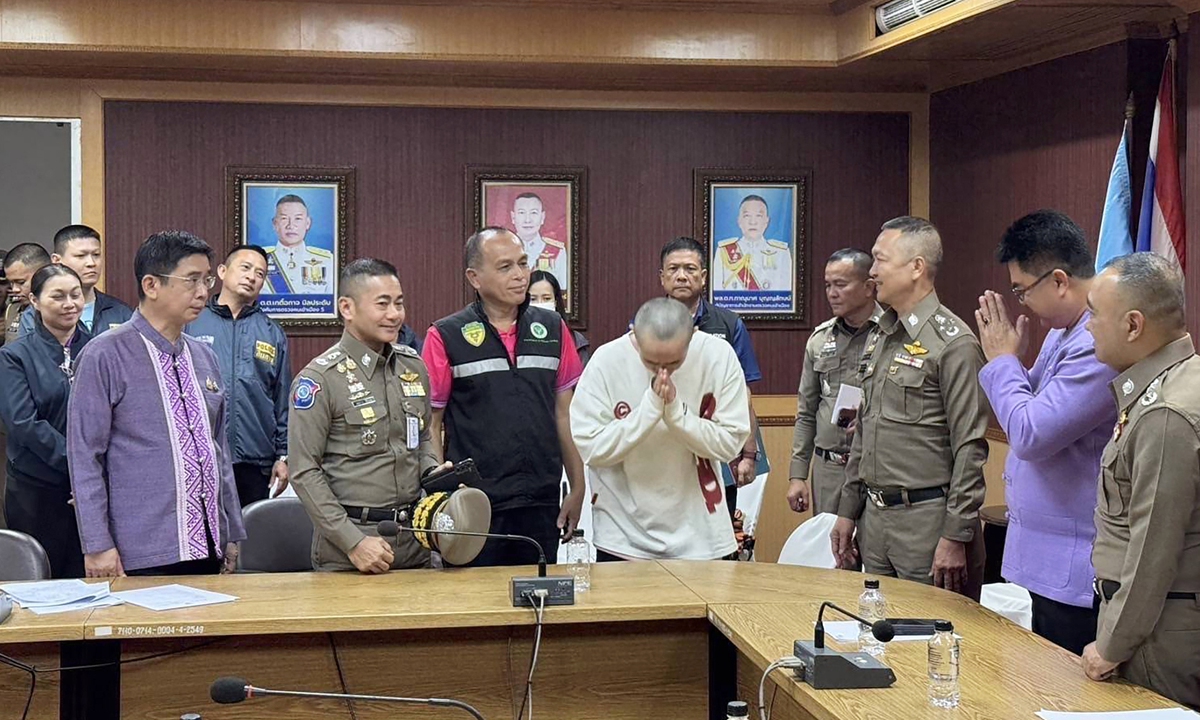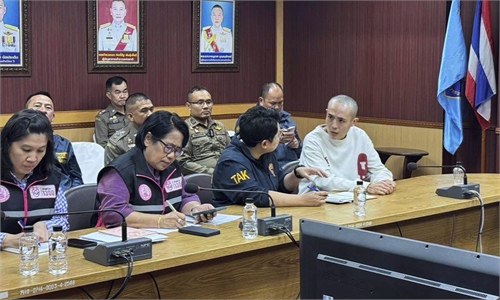Families of stranded Myanmar personnel appeal for help following rescue of missing Chinese actor Wang Xing

A handout photo made available by the Royal Thai Police shows Chinese actor Wang Xing (C) thanking Thai police officers after returning from Myanmar, at the Thai-Myanmar border district of Mae Sot, Tak province, Thailand, 07 January 2025. Photo: VCG
A joint letter asking for help from the families of 174 individuals trapped in Myanmar has been trending on China's social media platform Sina Weibo on Thursday, following the rescue of Chinese actor Wang Xing from a Thailand-Myanmar border region, which brought the public spotlight again on telecom fraud operating in Myanmar as Thai police said Wang was a victim of human trafficking.
In the wake of an online call launched by Jia Jia, who claimed to be Wang's girlfriend, which brought significant awareness to the actor's situation, the families of the 174 individuals trapped in northern and eastern Myanmar are worried that they are victims of human trafficking and thus wrote a joint letter to ask for a help online.
In a group on WeChat the families established, the Global Times found a document containing information about their missing relatives including the age, origin, time, and routes of disappearance. The document indicates that most of the missing persons are aged between 17 and 35 with men being the majority. The information reveals that the missing individuals have been unaccounted for, for a few months to three years.
One of the WeChat group organizers, Dai, told the Global Times on Thursday that she had made the online document public in an effort to expand the database and help more victims return home.
After analyzing the document, the Global Times found that the missing relatives' disappearance primarily follows two routes: Some went missing after entering Myanmar near the Thai-Myanmar border, while others disappeared after crossing the border from China's border city of Yunnan into Myanmar.
Three families told the reporter that they occasionally received messages sent by their relatives which suggested that they were taken to northern and eastern Myanmar after traveling through Thailand, particularly in Myawaddy and Tachilek, where they were forced to participate in telecom fraud or other illegal activities.
The number of families contributing information to the document continues to grow.
One family member, surnamed Bai, shared with the Global Times that his son went missing in early August in 2024 after entering Myanmar to "discuss business investment pitched by a friend." The son later managed to send a covert distress signal to his family 10 days later, indicating that he was in fact trapped in a telecom fraud center and forced to engage in illegal transactions. All of his personal belongings had been confiscated or burned, and the location he managed to send back was distorted by the center's jamming devices.
Bai's son said that upon entry, he was transferred to different vehicles, and he and other victims were filmed and photographed while being coerced into admitting they had "voluntarily entered Myanmar." The "organizers" then sent the victims into different scam centers based on the price they could fetch.
According to the three family members, the messages also indicated that due to intensified police crackdowns by the authorities in China, Myanmar, and Thailand, profits from these scam centers have since dwindled. As a result, these centers have ramped up their deceptive tactics. With the increased pressure from law enforcement, they moved from northern Myanmar to the eastern regions of the country.
New types of scams are also emerging, such as luring victims under the guise of recruiting actors or language teachers, according to Bai.
Zhuang Hua, an associate professor at the Guangdong Police College who has long studied cross-border crime, told the Red Star News affiliated with Chengdu Commercial Daily, that in recent years, as criminal gangs involved in telecom fraud have continuously updated their operational tricks and technologies, the government has also been intensifying its efforts to regulate the related industrial chains of cybercrime. This includes comprehensive control of these black and gray industries from the source and across the entire chain, implementing measures such as cleaning up fraudulent bank cards, phone cards, and internet accounts.
Despite the deepening efforts, with increasing intensity, frequency, and coverage, new fraud tactics continue to emerge in response to changing circumstances, making it more challenging to completely eradicate online telecom fraud, said the expert.
In recent years, telecom fraud syndicates operating in northern Myanmar have been unscrupulously targeting Chinese citizens, luring them to travel to their sites and participate in their fraudulent schemes against residents in China. These criminal activities posed a significant threat to the safety and property of Chinese citizens.
China's Ministry of Public Security has been promoting cross-border law enforcement cooperation to combat telecom fraud originating from northern Myanmar since September 2023, according to a CCTV news report.
On November 21, 2024, the ministry declared that all large-scale telecom fraud centers located near the China-Myanmar border in northern Myanmar had been wiped out. Over 53,000 Chinese nationals suspected of telecom frauds were arrested with cooperative efforts from Chinese and Myanmar police, according to the Xinhua News Agency.
On December 30, a total of 39 members of major criminal groups based in northern Myanmar were prosecuted in China for telecom fraud and other crimes targeting civilians in China. Additionally, several thousand other suspects linked to the criminal groups are currently under investigation by procuratorates in Wenzhou and other locations across China, Xinhua reported.
Over 10,000 confirmed cases of telecom fraud associated with these suspects have been reported, amounting to billions of yuan, with several Chinese citizens having lost their lives.
Chinese procurators emphasized that the case reflects China's dedication to protecting the legitimate rights and interests of the nation and its citizens.


